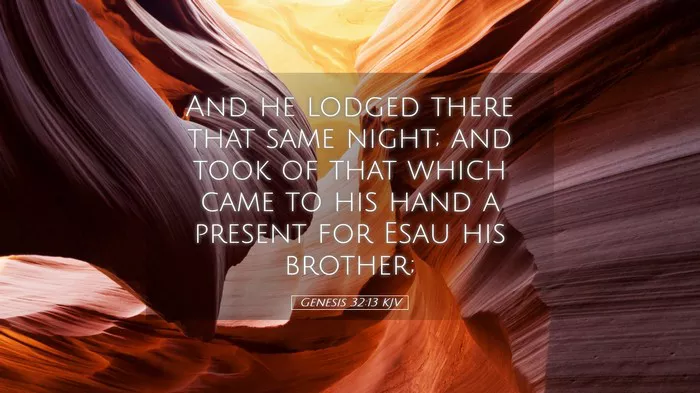Read the Daily Bible Verse – Genesis 32:13 To Strengthen Your Spiritual Journey.
The Context on Genesis 32:13 KJV
In Genesis 32, Jacob is on a tense journey. Years earlier, Jacob had fled his home due to his brother Esau’s anger over their father’s blessing, which Jacob received through cunning. Jacob, now older, is returning to Canaan with his family and substantial wealth but is uncertain about Esau’s intentions. Genesis 32:13 reads in the King James Version (KJV): “And he lodged there that same night; and took of that which came to his hand a present for Esau his brother.”
This verse is the culmination of Jacob’s strategic and humble planning. Having prayed to God for protection, Jacob prepares gifts as a peace offering to pacify Esau’s potential wrath. This passage highlights Jacob’s acknowledgment of his vulnerable position and his genuine effort to mend the past.
The Genesis 32:13 Meaning
Genesis 32:13 reflects themes of repentance, humility, and foresight. Jacob’s actions are not merely an attempt to placate Esau but also serve as a sign of his changed heart. After wrestling with God later in the chapter, Jacob emerges transformed. Genesis 32:13 provides insight into the character of Jacob—a man who, though flawed, seeks redemption and is willing to make amends.
The choice of a gift (or “present”) symbolizes Jacob’s understanding of Esau’s culture, where giving gifts was a common way to signify respect and good intentions. This verse emphasizes Jacob’s earnestness in bridging the gap with his brother, showing that reconciliation requires a combination of humility, repentance, and material gestures that reflect inner change.
Genesis 32:13 Application in Life
Genesis 32:13 offers a meaningful lesson on facing conflicts in our lives with humility and foresight. Jacob’s preparation shows a practical approach to addressing interpersonal conflicts: seek peace and be proactive. In modern relationships, misunderstandings or estrangement can sometimes fester if not addressed with humility and a genuine desire to reconcile. Like Jacob, we can pray, reflect, and take appropriate steps to mend relationships. His choice to send a peace offering shows that he values harmony over pride or material possession.
Jacob’s faith is also a critical takeaway. Although he planned carefully, he ultimately relied on God’s will for the outcome. In times of fear or uncertainty, this verse encourages believers to balance prayerful dependence on God with diligent, humble action.
Comparison with Other Biblical Texts
Genesis 32:13 can be compared with other biblical instances of reconciliation and humble gestures. For example:
Proverbs 15:1 – “A soft answer turneth away wrath.” Jacob’s gentle approach toward Esau aligns with this principle, as he diffuses potential anger with kindness rather than hostility.
Matthew 5:9 – “Blessed are the peacemakers: for they shall be called the children of God.” Jacob’s actions can be seen as embodying this beatitude, as he seeks peace despite uncertainty.
Romans 12:18 – “If it be possible, as much as lieth in you, live peaceably with all men.” This verse echoes Jacob’s intent to reconcile with Esau to the best of his ability, aligning with Paul’s admonition to seek peace.
These passages show the value of Jacob’s peace offerings and his efforts at reconciliation as part of a broader biblical theme where peace is prioritized even in challenging relationships.
Modern-Day Relevance
In contemporary life, Genesis 32:13 has profound relevance. Conflict is a common part of life, whether in families, workplaces, or communities. Jacob’s actions demonstrate how humility and preparation can go a long way in resolving tension. The verse also encourages believers to value relationships over material wealth or pride and to seek forgiveness with sincerity.
In today’s world, where relationships are often fractured by pride, fear, or misunderstanding, Genesis 32:13 invites readers to embrace humility and forgiveness. Jacob’s willingness to humble himself before Esau underscores the importance of prioritizing peace, which resonates in our increasingly individualistic society. Reconciliation requires a blend of intention, humility, and, sometimes, tangible steps—like offering an apology or extending a gift as Jacob did.
Conclusion
Genesis 32:13 presents a unique insight into the nature of reconciliation. Jacob’s journey of preparing for Esau’s forgiveness reflects a biblical principle of humility and personal responsibility in mending relationships. Jacob’s actions exemplify a balanced approach, grounded in faith yet executed with careful thought and sensitivity. This verse remains relevant in modern applications, showing that genuine humility, coupled with faith, can bridge divisions and foster peace.
In summary, Genesis 32:13 serves as a reminder of the power of reconciliation. Jacob’s preparation reflects not only wisdom but also transformation—a model of faith in action that calls each of us to seek peace and humility in our own lives.
Related topics:
- Genesis 32:12 Meaning, Context & Commentary
- What Does Genesis 32:11 Mean?
- What Does Genesis 32:10 Mean?

